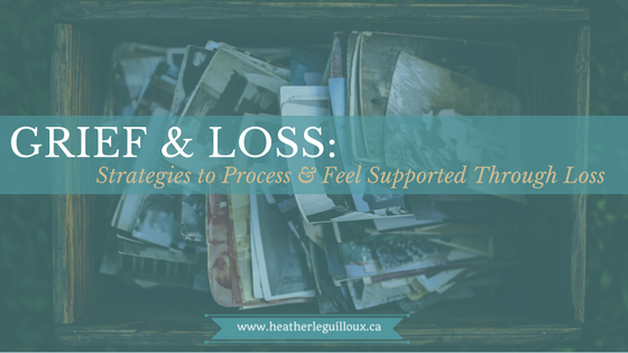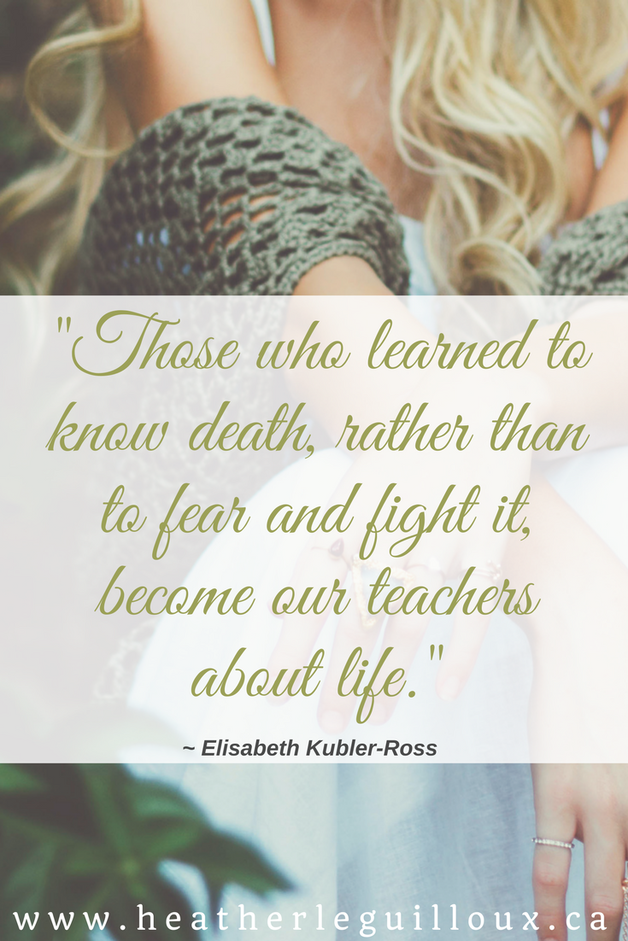|
|The emotional toll a loss can have on an individual can impact on many different areas of a persons well-being, relationships or life in general. Thankfully, humans are quite resilient in that we have an innate ability to move through the steps of grief in order to continue living and, eventually, thriving, even after a devastating loss.
To the person experiencing a loss, it can seem impossible for 'things to ever be the same again', and perhaps there is truth in this statement. Experiencing a loss demands that a person accept a new reality for themselves. The road to this acceptance can be bumpy and may have many setbacks, but most people are able come out the other side unscathed.
However, if you are reading this post and you are not feeling as if you can cope on your own or having thoughts of harm or suicide, please reach out for more support. This post will explore strategies that can ease a persons experience of loss, as well as professional supports available. In case you missed the previous articles in this series, here are the links to bookmark for later: Strategies to Process a Loss
Following the initial reactions of a loss, an individual usually enters the phase of grief called mourning, which is a natural process of accepting or being at peace with the loss. There is no set time frame or hurdles to pass over in order to pass through the mourning stage. For some (perhaps most) individuals, the pain of the loss never fully goes away, and may increase with a memory or reminder of the loss, but the intensity of the pain usually will ease over time.
There are many strategies that can help ease the pain of a loss, yet it's important to remember that each person is unique, each experience of loss is unique, and so too will the ways an individual finds to cope be unique and individualized to that person. Be mindful of your experience of mourning Grief is a normal experience and allowing this process to occur can bring about the process of mourning or being able to accept or endure the loss. As such, when difficult emotions surface, rather than dismissing these emotions, allow yourself to experience any emotions that surface for as long as you feel able. Another option is to set aside time during your day to allow yourself these moments to grieve fully. Seek support from family & friends When the raw, acute pain of a loss subsides, it can be helpful to have a network of support that can be there and listen to your experience of grief. Others may not be able to know exactly how the grief feels, but they may be experiencing their own pain and can relate to just how hard it can be. Express yourself creatively Finding an outlet to express and process the difficult emotions connected to grief can be hugely beneficial for some individuals. Some possibilities include journaling, drawing, painting, singing, dancing and more more. Perform rituals to help the mourning process Many cultures perform rituals to honour and mark a passing or significant loss including funerals, parades, or shaving facial hair. Other, non-religious rituals can include creating a momento or poem of the loss, writing a goodbye letter, or creating a memory box with photos or keepsakes to cherish memories and honour a loss.
Take care of your physical and mental well-being
Maintain physical health through regular exercise, a healthy diet, drinking plenty of fluids, and having enough sleep. Check in with your mental well-being during the grief and mourning process and reach out for more support as needed (more information in the next section). Maintain a routine Moving forward with life can feel impossible after the experience of any loss yet maintaining a routine can help to identify areas of life that an individual is still a part of, even after experiencing this loss. Finding areas of life that are less painful or even still produce joy or contentment can show an individual that they can still experience fulfillment in life and that the loss can feel less heavy over time. Be kind to yourself Find ways to remind yourself that it's okay to take time to process a loss and to grieve and mourn in your own way. Be kind to yourself through small gestures of kindness or support. Please note: Prolonged grief or the inability to mourn a loss may indicate complicated grief. Meaning-Making
|
Professional Supports
Grief Counselling
Grief or bereavement counselling focuses on helping a grieving individual (or couple or family) through the process or stages of grief. With the aid of a therapist, the client is helped to understand that their reactions to a loss are normal and that expressing these reactions or feelings are completely normal. For some, the counselling room can be a safe space to express themselves either verbally, through crying, or other healthy ways of expression (eg. art therapy).
Other components of grief therapy can include exploringthe meaning of the loss, creating or adapting a new identity for the client in order to help accept their new reality, and building new relationships or connections with others. Grief therapy can be especially important for an individual experiencing complicated grief, as it may not be possible to move through the stages of grief or mourning alone.
Support Groups
Joining a support group can be beneficial for a person to know that others have been through a similar experience of loss and can identify on some level with the pain that the loss has caused. It can be comforting to know that others understand that things aren't okay at that moment and that it seems impossible to mourn because it can seem like these acts or rituals will make the loss 'more real'. A support group is usually led by a mediator (a volunteer or grief counsellor) who can help the group through activities that promote healthy grieving practices.
Grief Helplines
For some individuals, even the thought of leaving the house can be too much. Support can also be found over the phone through grief helplines. Many helplines are staffed by professional counsellors who trained volunteers who are adept at creating a safe and comforting space for an individual to express their grief in a short-term supportive environment. Many countries have grief helplines and a quick Google search can help you to find one in your area code.
Online Therapy
There are also many options for online counselling which can suit many individuals who would like more support through their grief. The options for online counselling are similar for face-to-face including video, audio-only, and chat with the benefit of being able to talk with a therapist in the comfort of your own home or office (and in your pajamas, if you want).
MENTAL HEALTH RESOURCE VAULT
Great!
Check your email for instructions on how to access
the Mental Health Resource Vault.
If you're looking for more information on mental health topics, check out my previous series on anxiety and depression.
Thank you so much Heather, for allowing me to tell my story of grief and loss and coming back from it. For a long time, after my sister's suicide, I was broken, not knowing if I would be put back together again. When I started me blog, I didn't think even one person would read it, besides my mom, lol. I always said, if I help even one person in this process then I would consider myself successful. I love your site and I think it's so helpful. Thanks again
Thank you for being a part of this months blog series, Connie. I really appreciate that you have been able to share your story with my readers and I feel it was a good way to start off the series on grief and loss with a real story of loss for those readers who may not have endured a significant loss in their lives. Let me know if you want to collaborate again in the future, take good care!
I went through grief and loss when I quit medical school. Becoming a medical doctor was like a dream that died... I went through the same steps and did similar strategies. I feel so much better now. Thank you so much for this wonderful post!
Karla
http://thewiselark.karlacruzado.com
Yes, loss can happen in so many situations, including transitions like not being able to achieve the dream career you had hoped for. I'm glad that you are feeling better now and that you were able to progress through the stages of grief. Thank you so much for your comment, take care, Karla!
Thank you. I love this article. I recently lost two people in my life and while I did these things on my own, it is always reassuring to know what you are going through is normal and you are progressing through the healing process.
Hi Teresa, thank you for your comment. I'm sorry to hear about your recent losses - I wish you a safe journey through your healing process. Take good care of yourself!
These are all great tips when experiencing a loss. When my family lost my uncle a year and a half ago, I had to especially be mindful and let myself process the feelings I was experiencing. Seeking help from friends and family, and doing something creative, are also great strategies when dealing with a loss.
I thought it was an important reminder for people that it's okay to feel any of the emotions that come up during the grieving process, even if they're really difficult ones. I'm glad that you found ways to process the emotions you experienced during your recent loss and that being creative helped. Thank you for sharing, Bonnie!
Such an important blog, and very relevant to my life right now as I'm having a period of separation from my partner. This was so well worded and framed, and I really appreciate the truth of this part: "...it can seem impossible for 'things to ever be the same again', and perhaps there is truth in this statement. Experiencing a loss demands that a person accept a new reality for themselves..." So true, and such a vital thing to acknowledge.
Thank you for your comment, Arien.. I'm sorry to hear about your separation! It can be difficult to experience such a transition. I hope you find your way through this difficult time and that you take care of yourself throughout the process.
My mother passed away, 3 years ago, June 10. It has been the most difficult thing to ever experience.
The methods you talk about are very helpful. I have gone through the process very slowly, and as you mention, probably will never go away.
Through my experience, I've been able to help a good friend, grieve the passing of her father.
♥ to all those who are recently going through the grieving process. It is a difficult experience and I'm rooting for you.
Thank you for sharing your experience with loss and that you have been able to help a friend through their loss, too. I can hear how empathetic you are towards others going through the process of loss. Take good care of yourself as you care for others.
Thank you! Teal is my favourite colour so it was an easy choice. :) I'm glad you enjoyed the article, too!
You're very welcome, I'm glad you enjoyed the article. Take good care of yourself!
These are great tips for people who are grieving. I will proudly be sharing this. Thank you.
Thanks for sharing this. When I had my miscarriage almost 2 years ago, it hit me like a freight train. Even though I've experienced quite a few losses over the last few years, the miscarriage really hit me hard.
I went through all the different stages of loss and grief, but even having a background in psychology and mental health didnt help much other than the fact that I "knew" what was happening.
As bad as it may sound to some, but I'd like to credit me starting my blog to this loss. I had been thinking about writing and starting my blog for many years and being generally isolated due to my caregiver role didn't help my grief much. So that's when I decided I'd try it anyway, because what else is there to lose? To me, there was nothing worse than losing a child, so if I could manage working through this, then I could try to focus on something I'd been wanting to do for a ling time. And the added bonus was that I would be able to focus on something other than my loss.
This is a great article, Heather. Thanks!
Alisha, my heart goes out to you for having to endure such a loss. I can't even imagine what it would be like to experience this kind of loss but I'm so glad to hear that starting a blog helped you through this difficult time in your life. I think blogging can be as beneficial as journaling with the added benefit of being able to share your experience and help others through their own difficulties in life. Thank you so much for sharing your experience and for producing your own great content on your blog, as well! Take good care.
Hi Sahar, I'm glad to hear you were able to share the link to this post with a friend who is going through a tough time. I hope it's helpful for her! Take care.
This is a brilliant post and something i'm sure will be helpful to many people. I lost someone close to me almost 8 years ago and I still feel pain at times #MHlinky
Thank you for your comment and for dropping by the blog, Michelle!
Thanks for sharing this type of knowledge, Pet loss is one of the most painful experiences we can face. Not only have we lost our companion and friend, but often times we also lose the only constantly positive support and comfort we have in our lives.
Regards
Kevin Ringstaff
Leave a Reply.
MENTAL HEALTH RESOURCE VAULT
Great!
Check your email for instructions on how to access
the Mental Health Resource Vault.
Categories
All
Addiction
Anxiety
Bloggers Corner
Blog Update
Depression
DIY
Eating Disorders
Essential Oils
Finance
Grief
Health
Holiday
Journaling
Mental Health
Mindset
Organization
Relationships
Review
Self Care
Therapists Corner
Trauma
Yoga
Popular Posts
// Self-Care Bullet Journal Spreads
// 7 Ways Your Physical Health is Connected to Your Mental Health






 RSS Feed
RSS Feed
















